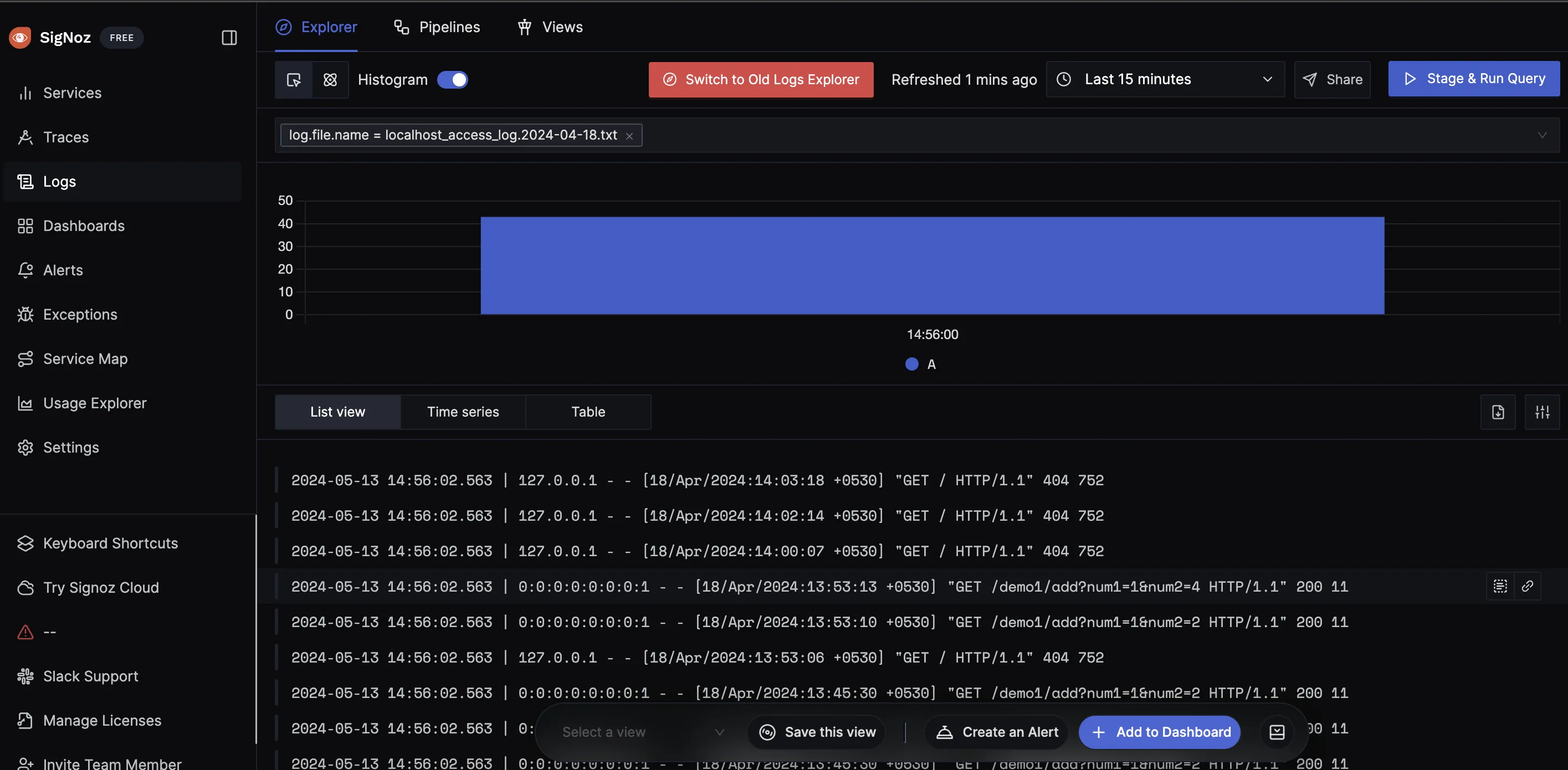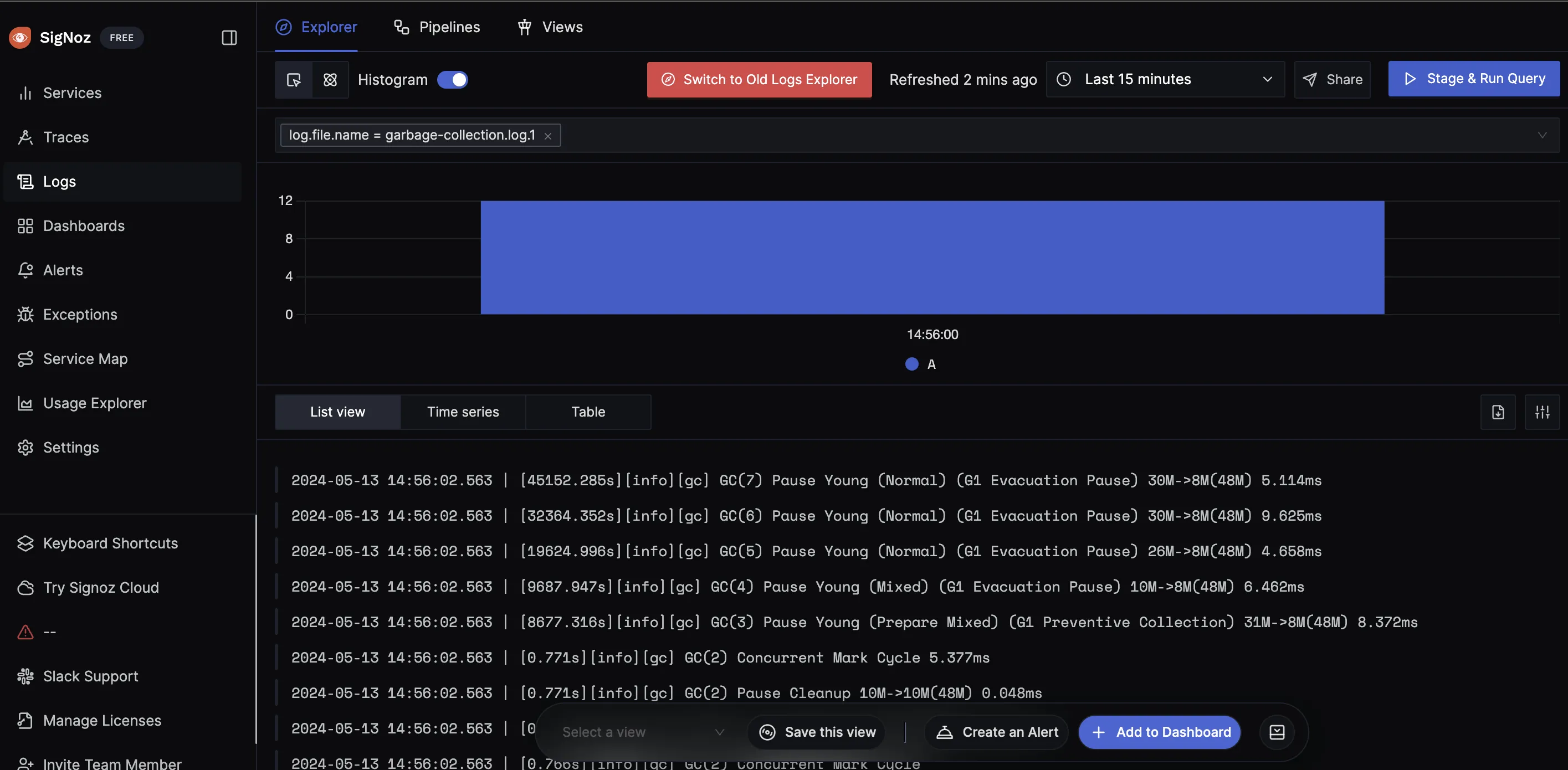Overview
You can configure OpenTelemetry Collector to read Tomcat Server Access and Garbage Collector logs and push them to SigNoz for analysis.
Steps to Collect Logs in SigNoz Cloud
1. Install OpenTelemetry Collector
The OpenTelemetry Collector provides a vendor-neutral way to collect, process, and export telemetry data (logs, metrics, traces). Follow this installation guide.
2. Configure Filelog Receiver
Modify the config.yaml file from the installation to include the filelog receiver:
receivers:
filelog/access_logs:
include: [/<path_to_access_log>/localhost_access_log.*] # Path to access logs
start_at: end
filelog/gc_logs:
include: [/<path_to_gc_log>/garbage-collection.log.*] # Path to garbage collector logs
start_at: end
- Use
start_at: endto transmit only new logs. Change tobeginningto include historical logs. - Update log paths using server arguments:
- Access logs:
-Dcatalina.base=<new_access_logs_path> - GC logs:
-Xloggc:<new_gc_logs_path>
- Access logs:
3. Update Pipelines Configuration
In the same config.yaml, add the receivers to the pipeline:
service:
logs:
receivers: [otlp, filelog/access_logs, filelog/gc_logs]
processors: [batch]
exporters: [otlp]
4. Restart the OTel Collector
Apply changes by restarting the OTel Collector.
5. Verify Export
Check the SigNoz UI for the exported logs.


Prerequisites
Steps to Collect Logs in Self-Hosted SigNoz
Scenario 1: SigNoz Running on the Same Host
1. Modify Docker Compose File
Update docker-compose-minimal.yaml to mount your log files:
otel-collector:
image: signoz/signoz-otel-collector:0.88.11
command: ["--config=/etc/otel-collector-config.yaml"]
volumes:
- ~/<access_logs_path>/:/<access_logs_path>/
- ~/<gc_logs_path>/:/<gc_logs_path>/
2. Add Filelog Receiver
Update otel-collector-config.yaml to include the filelog receiver:
receivers:
filelog/access_logs:
include: [/<path>/localhost_access_log.*] # Path to access logs
start_at: end
filelog/gc_logs:
include: [/<path>/garbage-collection.log.*] # Path to GC logs
start_at: end
3. Update Pipelines Configuration
Modify the pipeline to include the filelog receiver:
service:
logs:
receivers: [otlp, filelog/access_logs, filelog/gc_logs]
processors: [batch]
exporters: [clickhouselogsexporter]
4. Restart the OTel Collector
Restart the OTel Collector to apply changes. Guide here.
5. Verify Export
Check the SigNoz UI for the exported logs.


Scenario 2: SigNoz Running on a Different Host
1. Create OTel Collector Configuration
Define otel-collector-config.yaml:
receivers:
filelog/access_logs:
include: [/<path>/localhost_access_log.*]
start_at: end
filelog/gc_logs:
include: [/<path>/garbage-collection.log.*]
start_at: end
processors:
batch:
send_batch_size: 10000
send_batch_max_size: 11000
timeout: 10s
resource/env:
attributes:
- key: deployment.environment
value: staging
action: upsert
exporters:
otlp/log:
endpoint: http://<host>:<port>
tls:
insecure: true
service:
pipelines:
logs:
receivers: [filelog/access_logs, filelog/gc_logs]
processors: [batch, resource/env]
exporters: [otlp/log]
For HTTPS, configure certificates as per this guide.
